(PDF) The Volkswagen Emission Scandal
VerifiedAdded on 2021/06/16
|7
|1790
|28
AI Summary
Contribute Materials
Your contribution can guide someone’s learning journey. Share your
documents today.
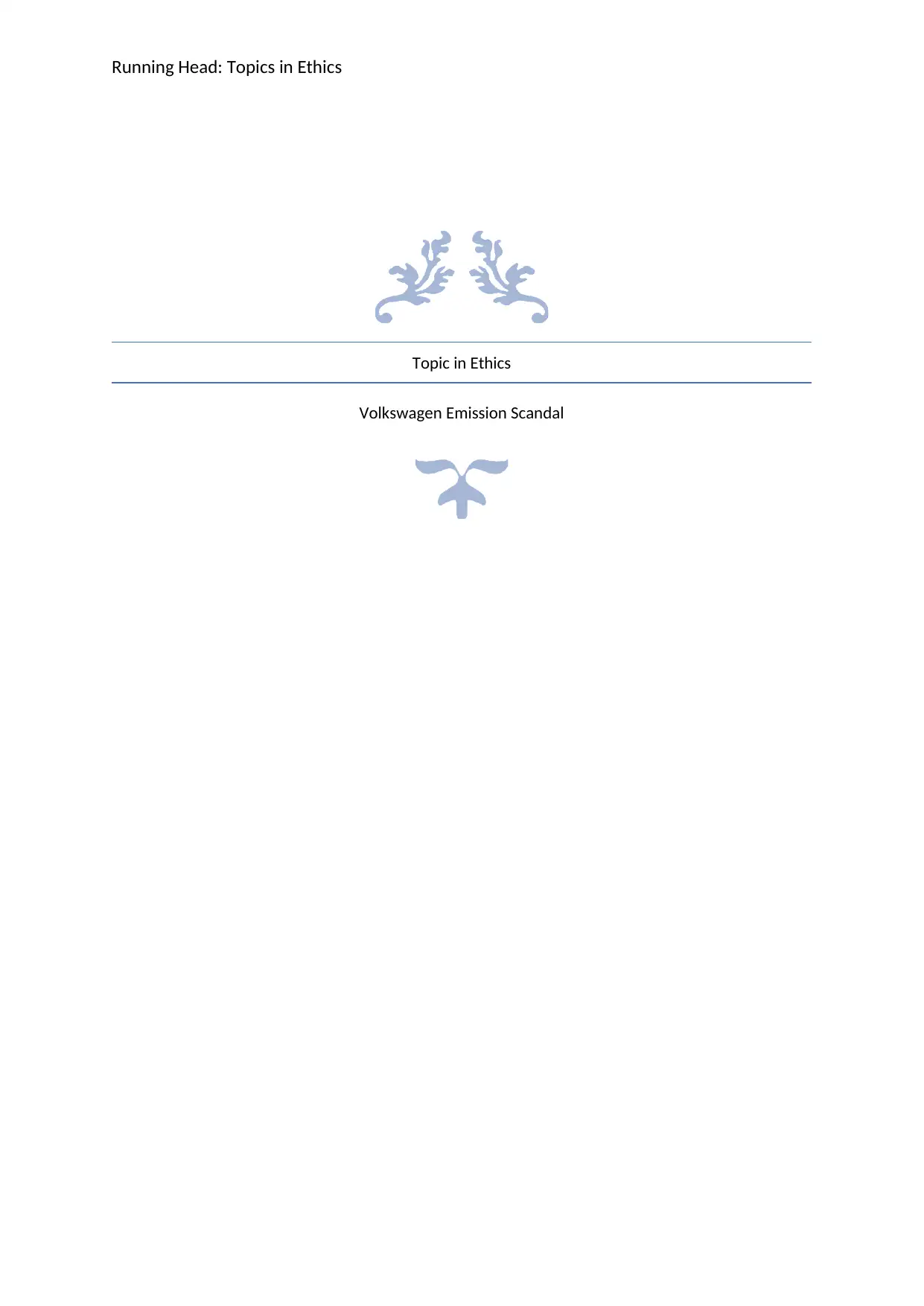
Running Head: Topics in Ethics
Topic in Ethics
Volkswagen Emission Scandal
Topic in Ethics
Volkswagen Emission Scandal
Secure Best Marks with AI Grader
Need help grading? Try our AI Grader for instant feedback on your assignments.
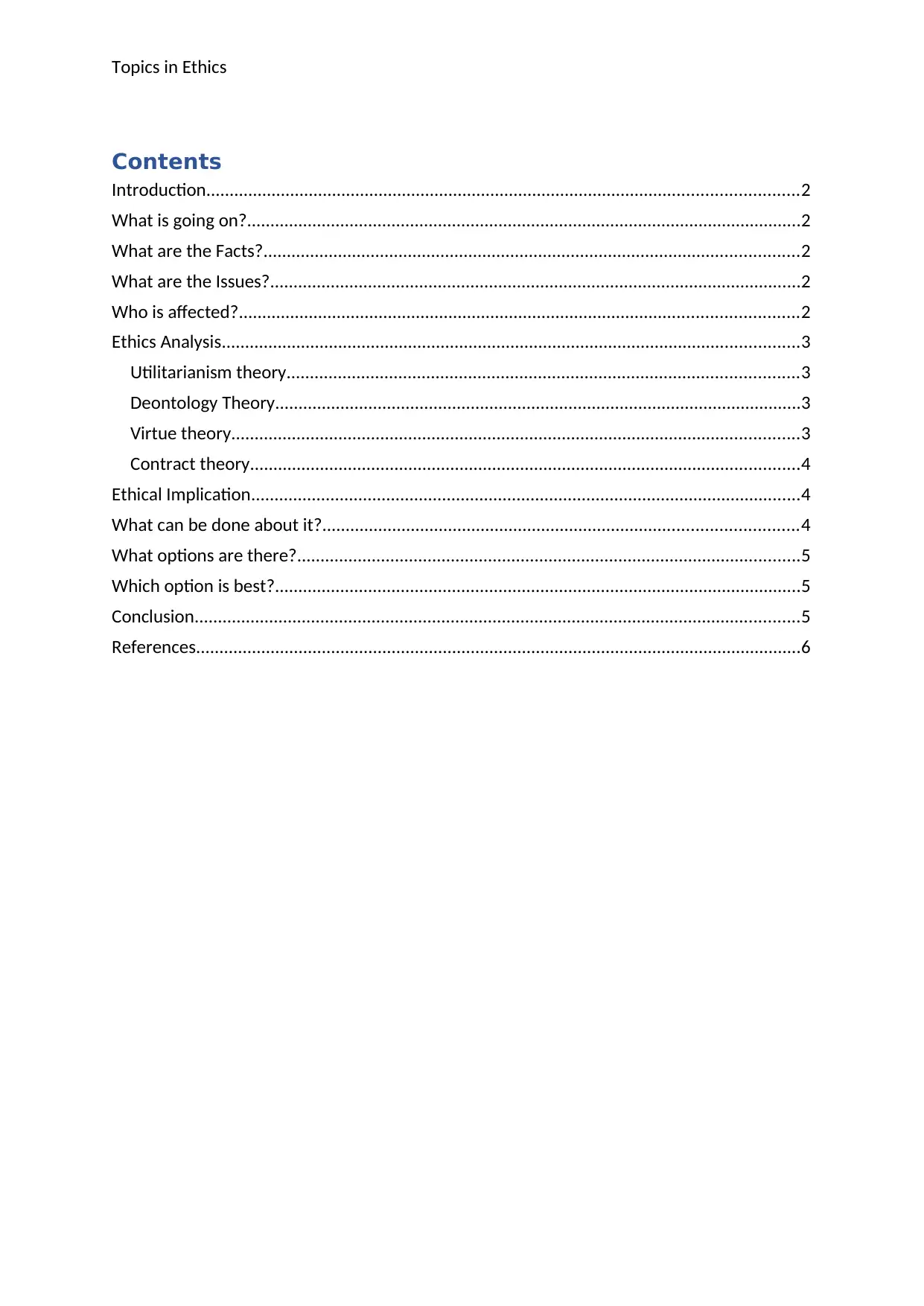
Topics in Ethics
Contents
Introduction...............................................................................................................................2
What is going on?.......................................................................................................................2
What are the Facts?...................................................................................................................2
What are the Issues?..................................................................................................................2
Who is affected?........................................................................................................................2
Ethics Analysis............................................................................................................................3
Utilitarianism theory..............................................................................................................3
Deontology Theory.................................................................................................................3
Virtue theory..........................................................................................................................3
Contract theory......................................................................................................................4
Ethical Implication......................................................................................................................4
What can be done about it?......................................................................................................4
What options are there?............................................................................................................5
Which option is best?.................................................................................................................5
Conclusion..................................................................................................................................5
References..................................................................................................................................6
Contents
Introduction...............................................................................................................................2
What is going on?.......................................................................................................................2
What are the Facts?...................................................................................................................2
What are the Issues?..................................................................................................................2
Who is affected?........................................................................................................................2
Ethics Analysis............................................................................................................................3
Utilitarianism theory..............................................................................................................3
Deontology Theory.................................................................................................................3
Virtue theory..........................................................................................................................3
Contract theory......................................................................................................................4
Ethical Implication......................................................................................................................4
What can be done about it?......................................................................................................4
What options are there?............................................................................................................5
Which option is best?.................................................................................................................5
Conclusion..................................................................................................................................5
References..................................................................................................................................6
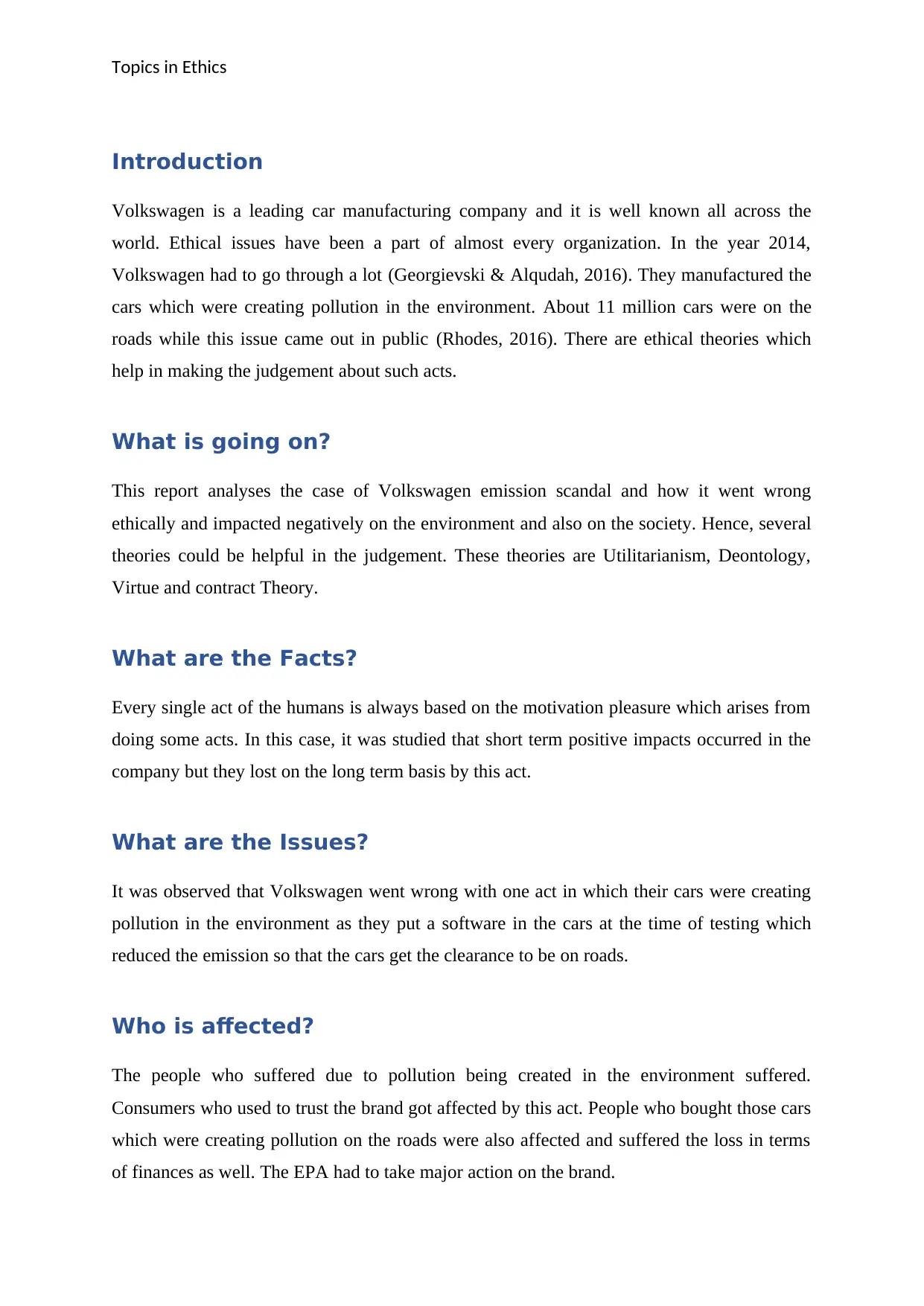
Topics in Ethics
Introduction
Volkswagen is a leading car manufacturing company and it is well known all across the
world. Ethical issues have been a part of almost every organization. In the year 2014,
Volkswagen had to go through a lot (Georgievski & Alqudah, 2016). They manufactured the
cars which were creating pollution in the environment. About 11 million cars were on the
roads while this issue came out in public (Rhodes, 2016). There are ethical theories which
help in making the judgement about such acts.
What is going on?
This report analyses the case of Volkswagen emission scandal and how it went wrong
ethically and impacted negatively on the environment and also on the society. Hence, several
theories could be helpful in the judgement. These theories are Utilitarianism, Deontology,
Virtue and contract Theory.
What are the Facts?
Every single act of the humans is always based on the motivation pleasure which arises from
doing some acts. In this case, it was studied that short term positive impacts occurred in the
company but they lost on the long term basis by this act.
What are the Issues?
It was observed that Volkswagen went wrong with one act in which their cars were creating
pollution in the environment as they put a software in the cars at the time of testing which
reduced the emission so that the cars get the clearance to be on roads.
Who is affected?
The people who suffered due to pollution being created in the environment suffered.
Consumers who used to trust the brand got affected by this act. People who bought those cars
which were creating pollution on the roads were also affected and suffered the loss in terms
of finances as well. The EPA had to take major action on the brand.
Introduction
Volkswagen is a leading car manufacturing company and it is well known all across the
world. Ethical issues have been a part of almost every organization. In the year 2014,
Volkswagen had to go through a lot (Georgievski & Alqudah, 2016). They manufactured the
cars which were creating pollution in the environment. About 11 million cars were on the
roads while this issue came out in public (Rhodes, 2016). There are ethical theories which
help in making the judgement about such acts.
What is going on?
This report analyses the case of Volkswagen emission scandal and how it went wrong
ethically and impacted negatively on the environment and also on the society. Hence, several
theories could be helpful in the judgement. These theories are Utilitarianism, Deontology,
Virtue and contract Theory.
What are the Facts?
Every single act of the humans is always based on the motivation pleasure which arises from
doing some acts. In this case, it was studied that short term positive impacts occurred in the
company but they lost on the long term basis by this act.
What are the Issues?
It was observed that Volkswagen went wrong with one act in which their cars were creating
pollution in the environment as they put a software in the cars at the time of testing which
reduced the emission so that the cars get the clearance to be on roads.
Who is affected?
The people who suffered due to pollution being created in the environment suffered.
Consumers who used to trust the brand got affected by this act. People who bought those cars
which were creating pollution on the roads were also affected and suffered the loss in terms
of finances as well. The EPA had to take major action on the brand.
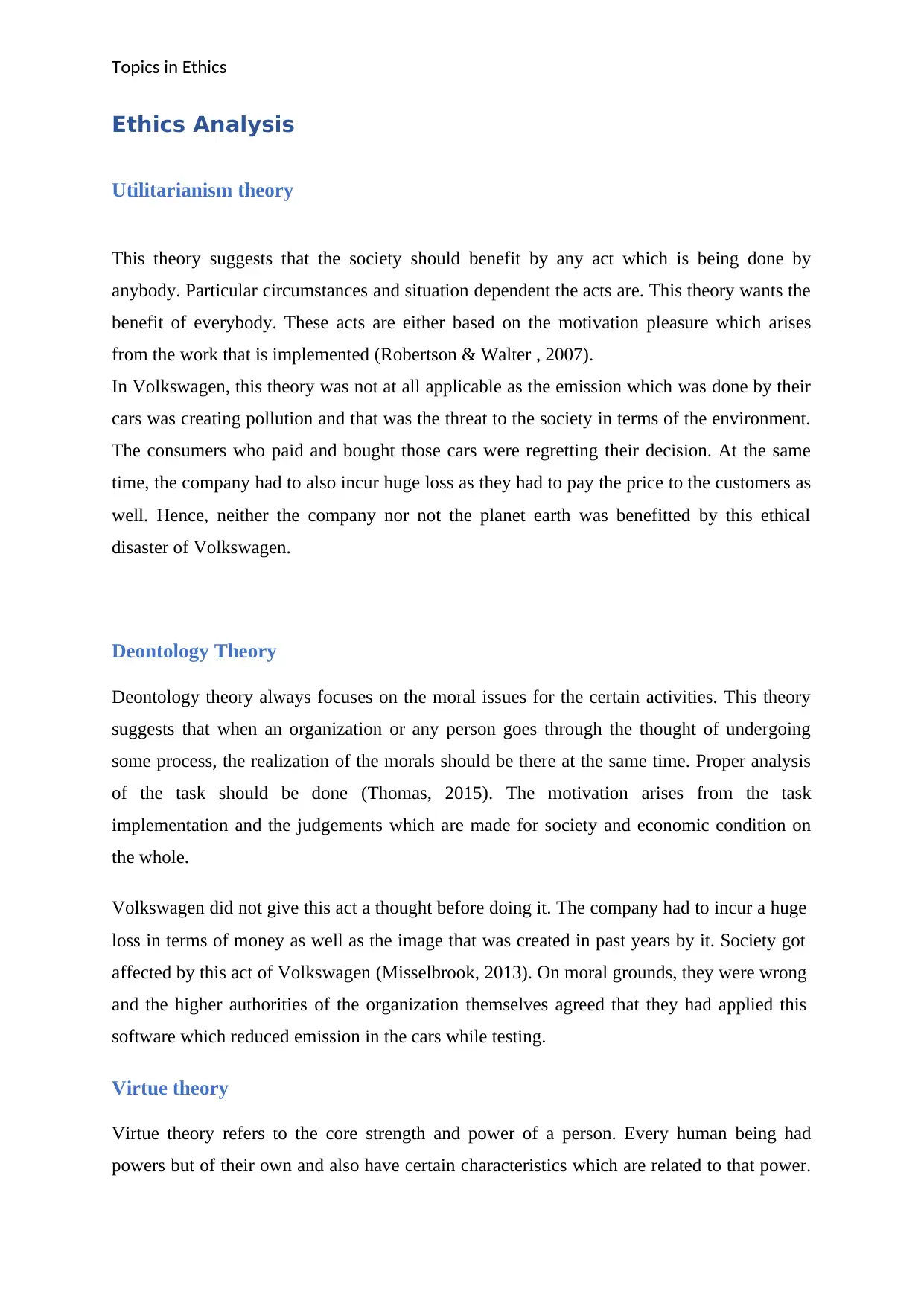
Topics in Ethics
Ethics Analysis
Utilitarianism theory
This theory suggests that the society should benefit by any act which is being done by
anybody. Particular circumstances and situation dependent the acts are. This theory wants the
benefit of everybody. These acts are either based on the motivation pleasure which arises
from the work that is implemented (Robertson & Walter , 2007).
In Volkswagen, this theory was not at all applicable as the emission which was done by their
cars was creating pollution and that was the threat to the society in terms of the environment.
The consumers who paid and bought those cars were regretting their decision. At the same
time, the company had to also incur huge loss as they had to pay the price to the customers as
well. Hence, neither the company nor not the planet earth was benefitted by this ethical
disaster of Volkswagen.
Deontology Theory
Deontology theory always focuses on the moral issues for the certain activities. This theory
suggests that when an organization or any person goes through the thought of undergoing
some process, the realization of the morals should be there at the same time. Proper analysis
of the task should be done (Thomas, 2015). The motivation arises from the task
implementation and the judgements which are made for society and economic condition on
the whole.
Volkswagen did not give this act a thought before doing it. The company had to incur a huge
loss in terms of money as well as the image that was created in past years by it. Society got
affected by this act of Volkswagen (Misselbrook, 2013). On moral grounds, they were wrong
and the higher authorities of the organization themselves agreed that they had applied this
software which reduced emission in the cars while testing.
Virtue theory
Virtue theory refers to the core strength and power of a person. Every human being had
powers but of their own and also have certain characteristics which are related to that power.
Ethics Analysis
Utilitarianism theory
This theory suggests that the society should benefit by any act which is being done by
anybody. Particular circumstances and situation dependent the acts are. This theory wants the
benefit of everybody. These acts are either based on the motivation pleasure which arises
from the work that is implemented (Robertson & Walter , 2007).
In Volkswagen, this theory was not at all applicable as the emission which was done by their
cars was creating pollution and that was the threat to the society in terms of the environment.
The consumers who paid and bought those cars were regretting their decision. At the same
time, the company had to also incur huge loss as they had to pay the price to the customers as
well. Hence, neither the company nor not the planet earth was benefitted by this ethical
disaster of Volkswagen.
Deontology Theory
Deontology theory always focuses on the moral issues for the certain activities. This theory
suggests that when an organization or any person goes through the thought of undergoing
some process, the realization of the morals should be there at the same time. Proper analysis
of the task should be done (Thomas, 2015). The motivation arises from the task
implementation and the judgements which are made for society and economic condition on
the whole.
Volkswagen did not give this act a thought before doing it. The company had to incur a huge
loss in terms of money as well as the image that was created in past years by it. Society got
affected by this act of Volkswagen (Misselbrook, 2013). On moral grounds, they were wrong
and the higher authorities of the organization themselves agreed that they had applied this
software which reduced emission in the cars while testing.
Virtue theory
Virtue theory refers to the core strength and power of a person. Every human being had
powers but of their own and also have certain characteristics which are related to that power.
Secure Best Marks with AI Grader
Need help grading? Try our AI Grader for instant feedback on your assignments.
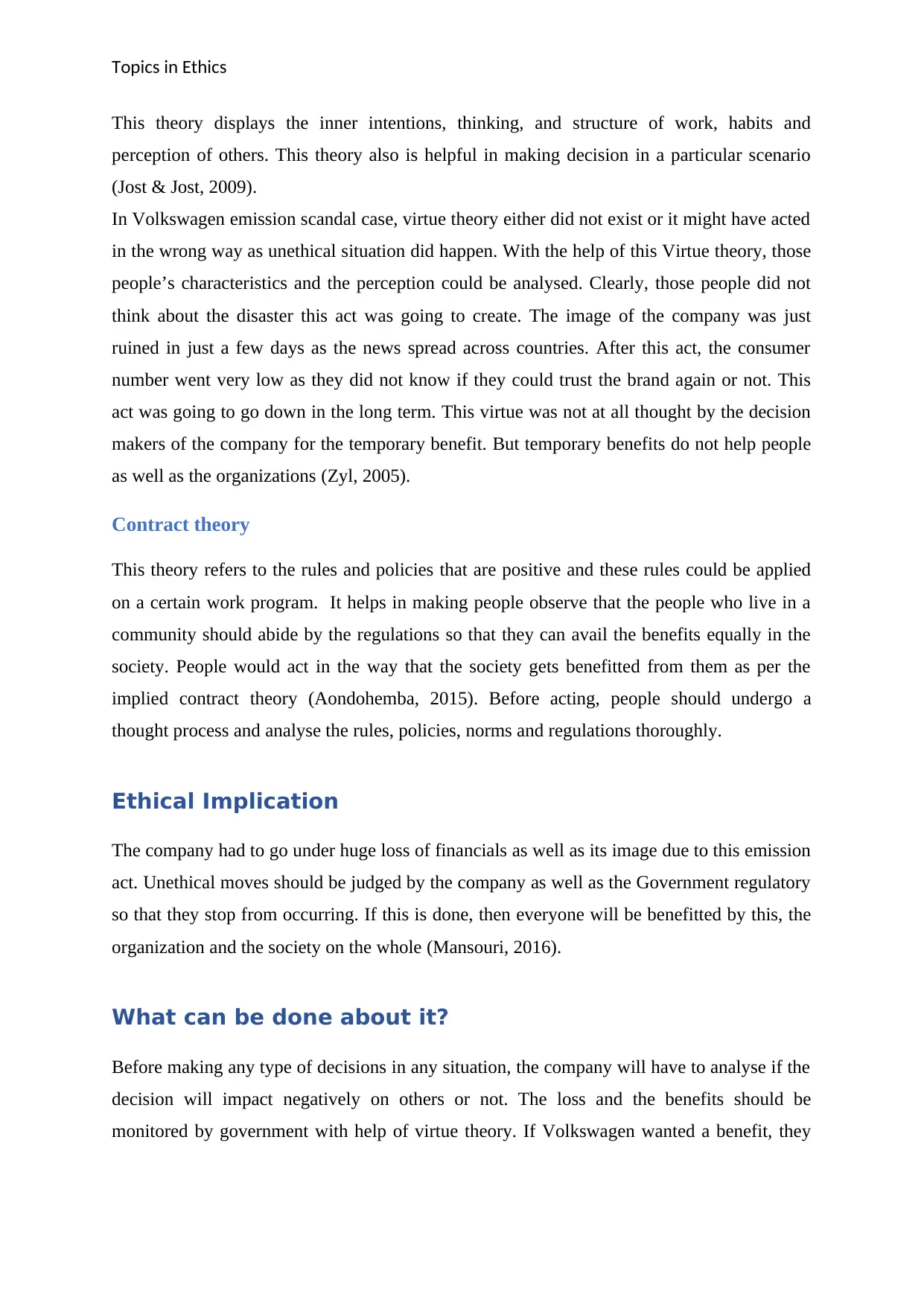
Topics in Ethics
This theory displays the inner intentions, thinking, and structure of work, habits and
perception of others. This theory also is helpful in making decision in a particular scenario
(Jost & Jost, 2009).
In Volkswagen emission scandal case, virtue theory either did not exist or it might have acted
in the wrong way as unethical situation did happen. With the help of this Virtue theory, those
people’s characteristics and the perception could be analysed. Clearly, those people did not
think about the disaster this act was going to create. The image of the company was just
ruined in just a few days as the news spread across countries. After this act, the consumer
number went very low as they did not know if they could trust the brand again or not. This
act was going to go down in the long term. This virtue was not at all thought by the decision
makers of the company for the temporary benefit. But temporary benefits do not help people
as well as the organizations (Zyl, 2005).
Contract theory
This theory refers to the rules and policies that are positive and these rules could be applied
on a certain work program. It helps in making people observe that the people who live in a
community should abide by the regulations so that they can avail the benefits equally in the
society. People would act in the way that the society gets benefitted from them as per the
implied contract theory (Aondohemba, 2015). Before acting, people should undergo a
thought process and analyse the rules, policies, norms and regulations thoroughly.
Ethical Implication
The company had to go under huge loss of financials as well as its image due to this emission
act. Unethical moves should be judged by the company as well as the Government regulatory
so that they stop from occurring. If this is done, then everyone will be benefitted by this, the
organization and the society on the whole (Mansouri, 2016).
What can be done about it?
Before making any type of decisions in any situation, the company will have to analyse if the
decision will impact negatively on others or not. The loss and the benefits should be
monitored by government with help of virtue theory. If Volkswagen wanted a benefit, they
This theory displays the inner intentions, thinking, and structure of work, habits and
perception of others. This theory also is helpful in making decision in a particular scenario
(Jost & Jost, 2009).
In Volkswagen emission scandal case, virtue theory either did not exist or it might have acted
in the wrong way as unethical situation did happen. With the help of this Virtue theory, those
people’s characteristics and the perception could be analysed. Clearly, those people did not
think about the disaster this act was going to create. The image of the company was just
ruined in just a few days as the news spread across countries. After this act, the consumer
number went very low as they did not know if they could trust the brand again or not. This
act was going to go down in the long term. This virtue was not at all thought by the decision
makers of the company for the temporary benefit. But temporary benefits do not help people
as well as the organizations (Zyl, 2005).
Contract theory
This theory refers to the rules and policies that are positive and these rules could be applied
on a certain work program. It helps in making people observe that the people who live in a
community should abide by the regulations so that they can avail the benefits equally in the
society. People would act in the way that the society gets benefitted from them as per the
implied contract theory (Aondohemba, 2015). Before acting, people should undergo a
thought process and analyse the rules, policies, norms and regulations thoroughly.
Ethical Implication
The company had to go under huge loss of financials as well as its image due to this emission
act. Unethical moves should be judged by the company as well as the Government regulatory
so that they stop from occurring. If this is done, then everyone will be benefitted by this, the
organization and the society on the whole (Mansouri, 2016).
What can be done about it?
Before making any type of decisions in any situation, the company will have to analyse if the
decision will impact negatively on others or not. The loss and the benefits should be
monitored by government with help of virtue theory. If Volkswagen wanted a benefit, they
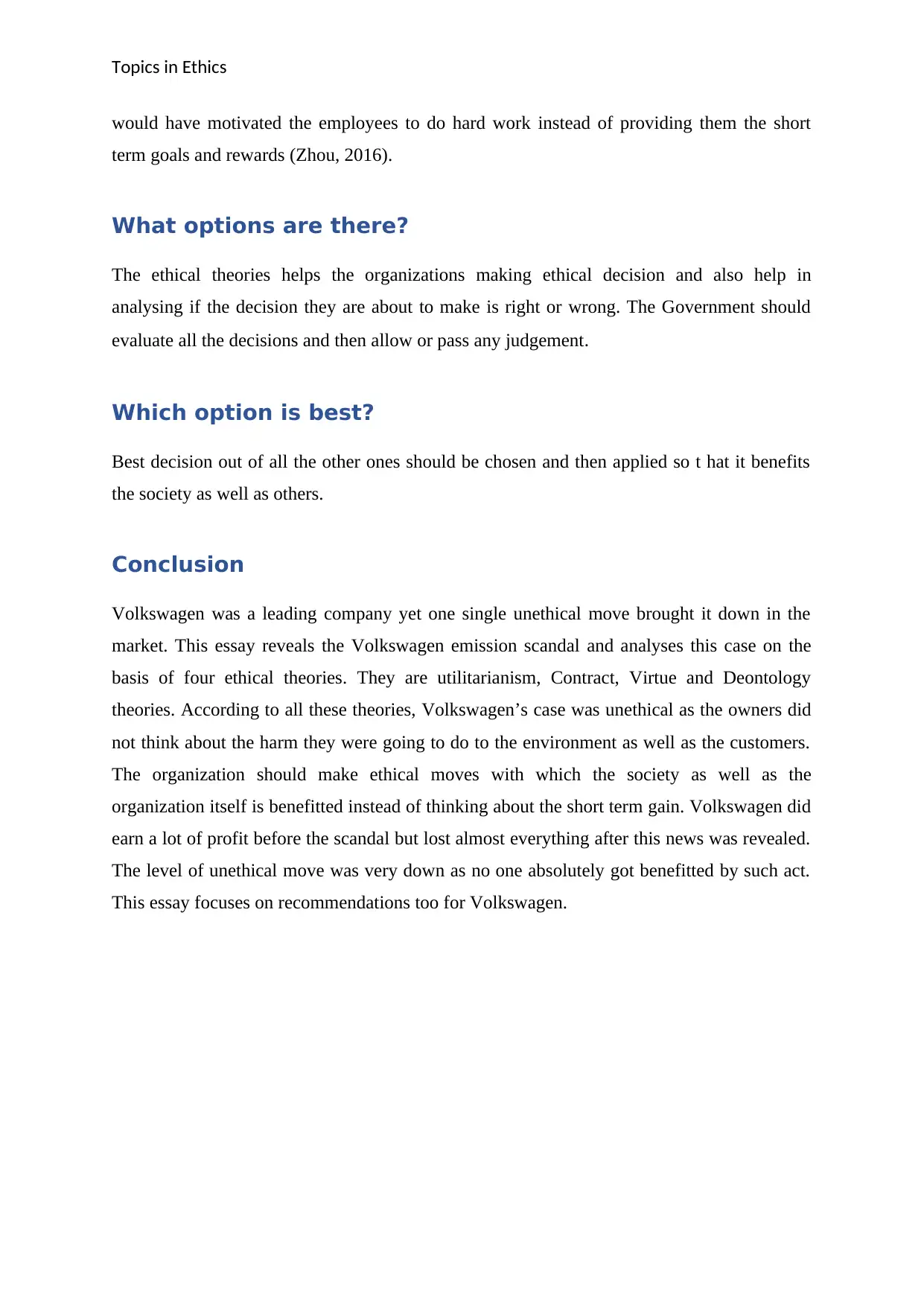
Topics in Ethics
would have motivated the employees to do hard work instead of providing them the short
term goals and rewards (Zhou, 2016).
What options are there?
The ethical theories helps the organizations making ethical decision and also help in
analysing if the decision they are about to make is right or wrong. The Government should
evaluate all the decisions and then allow or pass any judgement.
Which option is best?
Best decision out of all the other ones should be chosen and then applied so t hat it benefits
the society as well as others.
Conclusion
Volkswagen was a leading company yet one single unethical move brought it down in the
market. This essay reveals the Volkswagen emission scandal and analyses this case on the
basis of four ethical theories. They are utilitarianism, Contract, Virtue and Deontology
theories. According to all these theories, Volkswagen’s case was unethical as the owners did
not think about the harm they were going to do to the environment as well as the customers.
The organization should make ethical moves with which the society as well as the
organization itself is benefitted instead of thinking about the short term gain. Volkswagen did
earn a lot of profit before the scandal but lost almost everything after this news was revealed.
The level of unethical move was very down as no one absolutely got benefitted by such act.
This essay focuses on recommendations too for Volkswagen.
would have motivated the employees to do hard work instead of providing them the short
term goals and rewards (Zhou, 2016).
What options are there?
The ethical theories helps the organizations making ethical decision and also help in
analysing if the decision they are about to make is right or wrong. The Government should
evaluate all the decisions and then allow or pass any judgement.
Which option is best?
Best decision out of all the other ones should be chosen and then applied so t hat it benefits
the society as well as others.
Conclusion
Volkswagen was a leading company yet one single unethical move brought it down in the
market. This essay reveals the Volkswagen emission scandal and analyses this case on the
basis of four ethical theories. They are utilitarianism, Contract, Virtue and Deontology
theories. According to all these theories, Volkswagen’s case was unethical as the owners did
not think about the harm they were going to do to the environment as well as the customers.
The organization should make ethical moves with which the society as well as the
organization itself is benefitted instead of thinking about the short term gain. Volkswagen did
earn a lot of profit before the scandal but lost almost everything after this news was revealed.
The level of unethical move was very down as no one absolutely got benefitted by such act.
This essay focuses on recommendations too for Volkswagen.
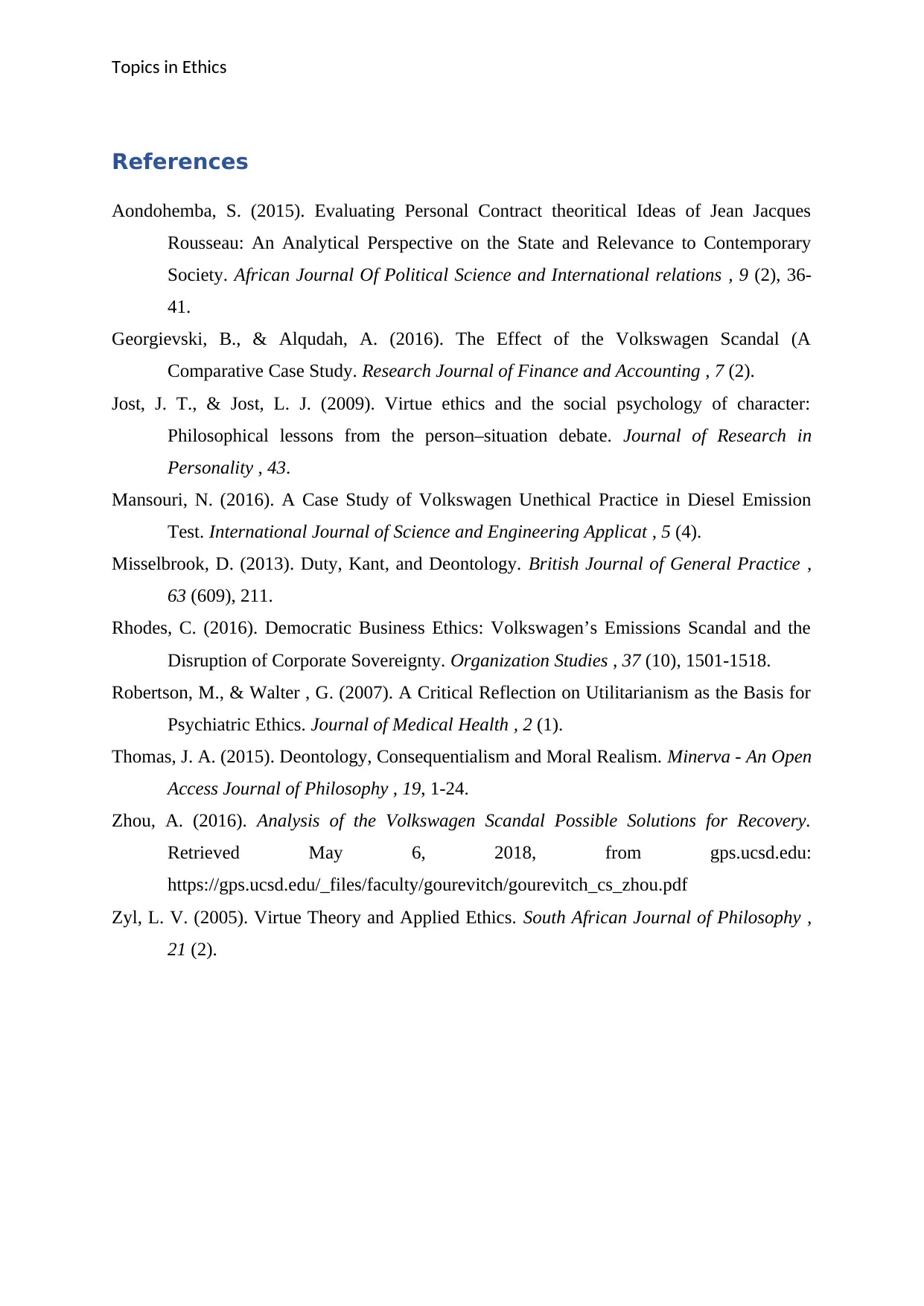
Topics in Ethics
References
Aondohemba, S. (2015). Evaluating Personal Contract theoritical Ideas of Jean Jacques
Rousseau: An Analytical Perspective on the State and Relevance to Contemporary
Society. African Journal Of Political Science and International relations , 9 (2), 36-
41.
Georgievski, B., & Alqudah, A. (2016). The Effect of the Volkswagen Scandal (A
Comparative Case Study. Research Journal of Finance and Accounting , 7 (2).
Jost, J. T., & Jost, L. J. (2009). Virtue ethics and the social psychology of character:
Philosophical lessons from the person–situation debate. Journal of Research in
Personality , 43.
Mansouri, N. (2016). A Case Study of Volkswagen Unethical Practice in Diesel Emission
Test. International Journal of Science and Engineering Applicat , 5 (4).
Misselbrook, D. (2013). Duty, Kant, and Deontology. British Journal of General Practice ,
63 (609), 211.
Rhodes, C. (2016). Democratic Business Ethics: Volkswagen’s Emissions Scandal and the
Disruption of Corporate Sovereignty. Organization Studies , 37 (10), 1501-1518.
Robertson, M., & Walter , G. (2007). A Critical Reflection on Utilitarianism as the Basis for
Psychiatric Ethics. Journal of Medical Health , 2 (1).
Thomas, J. A. (2015). Deontology, Consequentialism and Moral Realism. Minerva - An Open
Access Journal of Philosophy , 19, 1-24.
Zhou, A. (2016). Analysis of the Volkswagen Scandal Possible Solutions for Recovery.
Retrieved May 6, 2018, from gps.ucsd.edu:
https://gps.ucsd.edu/_files/faculty/gourevitch/gourevitch_cs_zhou.pdf
Zyl, L. V. (2005). Virtue Theory and Applied Ethics. South African Journal of Philosophy ,
21 (2).
References
Aondohemba, S. (2015). Evaluating Personal Contract theoritical Ideas of Jean Jacques
Rousseau: An Analytical Perspective on the State and Relevance to Contemporary
Society. African Journal Of Political Science and International relations , 9 (2), 36-
41.
Georgievski, B., & Alqudah, A. (2016). The Effect of the Volkswagen Scandal (A
Comparative Case Study. Research Journal of Finance and Accounting , 7 (2).
Jost, J. T., & Jost, L. J. (2009). Virtue ethics and the social psychology of character:
Philosophical lessons from the person–situation debate. Journal of Research in
Personality , 43.
Mansouri, N. (2016). A Case Study of Volkswagen Unethical Practice in Diesel Emission
Test. International Journal of Science and Engineering Applicat , 5 (4).
Misselbrook, D. (2013). Duty, Kant, and Deontology. British Journal of General Practice ,
63 (609), 211.
Rhodes, C. (2016). Democratic Business Ethics: Volkswagen’s Emissions Scandal and the
Disruption of Corporate Sovereignty. Organization Studies , 37 (10), 1501-1518.
Robertson, M., & Walter , G. (2007). A Critical Reflection on Utilitarianism as the Basis for
Psychiatric Ethics. Journal of Medical Health , 2 (1).
Thomas, J. A. (2015). Deontology, Consequentialism and Moral Realism. Minerva - An Open
Access Journal of Philosophy , 19, 1-24.
Zhou, A. (2016). Analysis of the Volkswagen Scandal Possible Solutions for Recovery.
Retrieved May 6, 2018, from gps.ucsd.edu:
https://gps.ucsd.edu/_files/faculty/gourevitch/gourevitch_cs_zhou.pdf
Zyl, L. V. (2005). Virtue Theory and Applied Ethics. South African Journal of Philosophy ,
21 (2).
1 out of 7
Related Documents
Your All-in-One AI-Powered Toolkit for Academic Success.
+13062052269
info@desklib.com
Available 24*7 on WhatsApp / Email
![[object Object]](/_next/static/media/star-bottom.7253800d.svg)
Unlock your academic potential
© 2024 | Zucol Services PVT LTD | All rights reserved.





